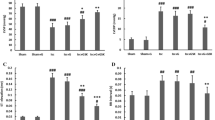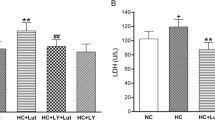Abstract
The acute, as well as late, phase of cardioprotection induced by ischemic preconditioning is abolished in hyperlipidemic (HL) rat heart. The pharmacological inhibition of glycogen synthase kinase-3β (GSK-3β), has earlier been reported to restore this attenuated acute cardioprotective effect. However, it not known whether GSK-3β inhibitors administered 24 h before the ischemic injury would restore the late cardioprotective in HL rat and, if yes, the role of heat shock protein 72 (HSP 72) in its modulation. Hyperlipidemia was produced in rat by feeding high-fat diet for 6 weeks. Isolated perfused rat heart was subjected to 30 min of ischemia followed by 120 min of reperfusion (I/R). Myocardial infarct size was estimated by triphenyltetrazolium chloride staining, while lactate dehydrogenase (LDH) and creatine kinase-MB (CK-MB) levels were analyzed from coronary effluent. GSK-3β inhibitors, SB 216763 (SB, 0.6 mg/kg, i.p.), and indirubin-3 monoxime (IND, 0.4 mg/kg, i.p.), administered 24 h before the isolation of heart, significantly decreased the I/R-induced myocardial infarct size and the release of LDH and CK-MB. The cardioprotective effect of GSK-3β inhibitors was significantly attenuated by quercetin (4 mg/kg, i.p.), a HSP 72 inhibitor, administered 1 h before the administration of SB or IND. That the late phase of cardioprotection induced by pretreatment with GSK-3β inhibitors is not attenuated/lost in HL rat heart is a new finding in our study. Our results indicate that HSP 72 acts on pathway of GSK-3β and plays a significant role in cardioprotection.





Similar content being viewed by others
References
Murry CE, Jennings RB, Reimer KA (1986) Preconditioning with ischemia: a delay of lethal cell injury in ischemic myocardium. Circulation 74:1124–1136
Juhaszaova M, Zorov DB, Kim SH, Pepe SFuQ, Fishbein KW, Ziman BD, Wang S, Ytrehus K, Antos CL, lson EN, Sollott SJ (2004) Glycogen synthase kinase-3beta mediates convergence of protection signaling to inhibit the mitochondrial permeability transition pore. J Clin Invest 113:1535–1549
Gross ER, Gross GJ (2006) Ligand triggers of classical preconditioning and postconditioning. Cardiovasc Res 70:212–221
Downey JM, Davis AM, Cohen MV (2007) Signalling pathways in ischemic preconditioning. Heart Fail Rev 12:181–188
Gross ER, Hsu AK, Gross GJ (2006) The JAK/STAT pathway is essential for opoid-induced cardioprotection: JAK2 as a mediator of STAT3, AKT, and GSK-3beta. Am J Physiol Heart Circ Physiol 291:H827–H834
Baxter GF, Yellon DM (1999) ATP-sensitive K+ channels mediate the delayed cardioprotective effect of adenosine A1 receptor activation. J Mol Cell Cardiol 31:981–989
Baxter GF, Ferdinandy P (2001) Delayed preconditioning of myocardium: current perspectives. Basic Res Cardiol 96:329–344
Hutter MM, Sievers RE, Barbosa V, Wolfe CL (1994) Heat-shock protein induction in rat hearts. A direct correlation between the amount of heat-shock protein induced and the degree of myocardial protection. Circulation 89:355–360
Snoeckx IH, Cornelussen RN, Van Nieuwenhoven FA, Reneman RS, van der Vusse GJ (2001) Heat shock proteins and cardiovascular pathophysiology. Physiol Rev 81:1461–1497
William RS, Benjamin IJ (2000) Protective responses in the ischemic myocardium. J Clin Invest 106:813–818
Zapletal C, Fallsehr C, Reidel M, Loffler T, Gebhard MM, Golling M (2010) Induction of HSP70 shows differences in protection against I/R injury derived by ischemic preconditioning and intermittent clamping. Microvasc Res 80(3):365–371
Karmazyn M, Mailer K, Currie RW (1990) Acquisition and decay of heat-shock-enhanced post-ischemic ventricular recovery. Am J Physiol Heart Circ Physiol 259:H424–H431
Tranter M, Ren X, Forde T, Wilhide ME, Chen J, Sartor MA (2011) NF-kappaB driven cardioprotective gene programs; Hsp70.3 and cardioprotection after late ischemic preconditioning. J Mol Cell Cardiol 49(4):664–672
Yamashita N, Hoshida S, Nishida M, Igarashi J, Aoki K, Hori M (1997) Time-course of tolerance to ischemia-reperfusion injury and induction of heat shock protein 72 by heat stress in the rat heart. J Mol Cell Cardiol 29:1815–1821
Marber MS, Walker JM, Latchman DS, Yellon DM (1994) Myocardial protection after whole body heat stress in the rabbit is dependent on metabolic substrate and is related to the amount of the inducible 70-kD heat stress protein. J Clin Invest 93:1087–1094
Yin C, Salloum FN, Kukreja RC (2009) A novel role of micro RNA in late preconditioning: upregulation of endothelial nitric oxide synthase and heat shock protein 70. Circ Res 104(5):572–575
Gross ER, Hsu AK, Gross GJ (2008) Delayed cardioprotection afforded by the glycogen synthase kinase 3 inhibitor SB-216763 occurs via a KATP- and MPTP-dependent mechanism at reperfusion. Am J Physiol Heart Circ Physiol 294:H1497–H1500
Csont T, Balogh G, Csonka C, Boros Imre, Horvath I (2002) Hyperlipidemia induced by high cholesterol diet inhibits heat shock response in rat hearts. Biochem Biophys Res Commun 290:1535–1538
Ferdinandy P, Szilvassy Z, Baxter GF (1998) Adaptation to myocardial stress in disease states: is preconditioning a healthy heart phenomenon? Trends Pharmacol Sci 19:223–229
Kyriakides ZS, Psychari S, Iliodromitis EK, Kolettis TM, Sbarouni E, Kremastinos DT (2002) Hyperlipidaemia prevents the expected reduction of myocardial ischemia on repeated balloon inflations during angioplasty. Chest 121:1211–1215
Yadav HN, Singh M, Sharma PL (2010) Modulation of the cardioprotective effect of ischemic preconditioning in hyperlipidaemic rat heart. Eur J Pharmacol 643(1):78–83
Chu B, Zhong R, Soncin F, Stevenson MA, Calderwood SK (1998) Transcriptional activity of heat shock factor 1 at 37 °C is repressed through phosphorylation on two distinct serine residues by glycogen synthase kinase 3 and protein kinases Cα and Cζ. J Biol Chem 273:18640–18646
Pearce NJ, Arch JR, Clapham JC, Coghlan MP, Corcoran SL, Lister CA (2004) Development of glucose intolerance in male transgenic mice overexpressing human glycogen synthase kinase-3beta on a muscle-specific promoter. Metabolism 53:1322–1330
Bijur GF, Jope RS (2000) Opposing actions of phospahtidylinositol 3-kinase and glycogen synthase kinase-3 beta in the regulation of HSF-1. Neurochemistry 75:2401–2408
Wang TD, Chen WJ, Mau TJ, Lin JW, Lin WW, Lee YT (2003) Attenuation of increased myocardial ischemia–reperfusion injury conferred by hypercholesterolemia through pharmacological inhibition in the caspase-1 cascade. Br J Pharmacol 138:291–300
Lorkowska B, Bartus M, Franczyk M, Kostogrys RB, Jawien J, Pisulewski PM (2006) Hypercholesterolemia does not alter endothelial function in spontaneously hypertensive rats. J Pharmacol Exp Ther 317:1019–1026
Reeves PG (1997) Components of the AIN-93 diets as improvements in the AIN-76a diet. J Nutr 127:838S–841S
Langendorff O (1895) Untersuchungen am uberlebender saugethierherzen. Pflügers Arch Gesmate Physiol 61:291–332
Fishbein MC, Meerbaum S, Rit J, Lando U, Kanmatsuse K, Merair JC, Corday E, Ganz W (1981) Early phase acute myocardial infarct size quantification: validation of the triphenyltetrazolium chloride tissue enzyme staining technique. Am Heart J 101:593–600
Chopra K, Singh M, Kaul N, Andrabi KJ, Ganguly NK (1992) Decrease of myocardial infarct size with dessferrioxamine. Possible role of oxygen free radicals in its ameliorative effect. Mol Cell Biochem 113:71–76
Hosokawa N, Hirayoshi K, Nakai A, Hosokawa Y, Marui N, Yoshida M, Sakaki T, Nishino H, Aoike A, Kawai K, Nagata K (1990) Flavonoids inhibit the expression of heat shock proteins. Cell Struct Funct 15:393–401
Nagai N, Nakai A, Nagata K (1995) Quercetin suppresses heat shock response by down regulation of HSF1. Biochem Biophys Res Commun 208:1099–1105
Debes A, Oerding M, Willers R, Gobel U, Wessalowski R (2003) Sensitization of human Ewing’s tumor cells to chemotherapy and heat treatment by the bioflavonoid quercetin. Anticancer Res 23:3359–3366
Yadav HN, Singh M, Sharma PL (2010) Involvement of GSK-3β in attenuation of cardioprotective effect of ischemic preconditioning in diabetic rat heart. Mol Cell Biochem 343:75–81
Bolli R (2000) The late phase of preconditioning. Cir Res 87:972–983
Bolli R, Dawn B, Tang XL, Qiu Y, Ping P, Xuan YT (1998) The nitric oxide hypothesis of late preconditioning. Basic Res Cardiol 93:325–338
Kis A, Yellon DM, Baxter GF (2003) Second window of protection following myocardial preconditioning: an essential role for PI3 kinase and p70s6 kinase. J Mol Cell Cardiol 35:1063–1071
Latchman DS (2001) Heat shock proteins and cardiac protection. Cardiovasc Res 51:637–646
Li R, Zheng W, Pi R, Gao J, Zhang H, Le PWK (2007) Activation of peroxisome proliferator-activated receptor-ά prevents glycogen synthase 3β phosphorylation and inhibits cardiac hypertrophy. FEBS 581:3311–3316
Marban E (1991) Myocardial stunning and hibernation: the physiology behind the colloquialisms. Circulation 83:681–688
Matter WF, Brown RF, Vlahos CJ (1992) The inhibition of phosphatidylinositol 3-kinase by quercetin and analogs. Biochem Biophys Res Commun 186:624–631
Levy J, Teuerstein I, Marbach M, Radian S, Sharoni Y (1984) Tyrosine protein kinase activity in the DMBA-induced rat mammary tumor: inhibition by quercetin. Biochem Biophys Res Commun 123:1227–1233
Yao YW, Zhang G, Zhang Y, Li W, Wang C, Yin CY, Zhang F (2011) Lipopolysaccharide pretreatment protects against ischemia/reperfusion injury via increase of HSP70 and inhibition of NF-κB. Cell Stress Chaperones 16:287–296
Liu J, Kam KWL, Zhou J, Yan W, Chen M, Wu S, Wong TM (2004) Effects of heat shock protein 70 activation by metabolic inhibition preconditioning or к-opioid receptor stimulation on Ca2+ homeostasis in rat ventricular myocytes subjected to ischemic insults. J Pharmacol Exp Ther 310:606–613
Malyshev IYu, Malysheva EV (1998) Heat-shock proteins and cardioprotection. Bull Exp Biol Med 126:1177–1183
Disclosure
No external source of funding was used in this study.
Author information
Authors and Affiliations
Corresponding author
Additional information
This work is dedicated to the memory of my esteemed teacher Prof. Manjeet Singh, expired on 30.3.2009, who gave me shape of a pharmacologist.
Manjeet Singh—deceased.
Rights and permissions
About this article
Cite this article
Yadav, H.N., Singh, M. & Sharma, P.L. Pharmacological inhibition of GSK-3β produces late phase of cardioprotection in hyperlipidemic rat: possible involvement of HSP 72. Mol Cell Biochem 369, 227–233 (2012). https://doi.org/10.1007/s11010-012-1386-8
Received:
Accepted:
Published:
Issue Date:
DOI: https://doi.org/10.1007/s11010-012-1386-8




